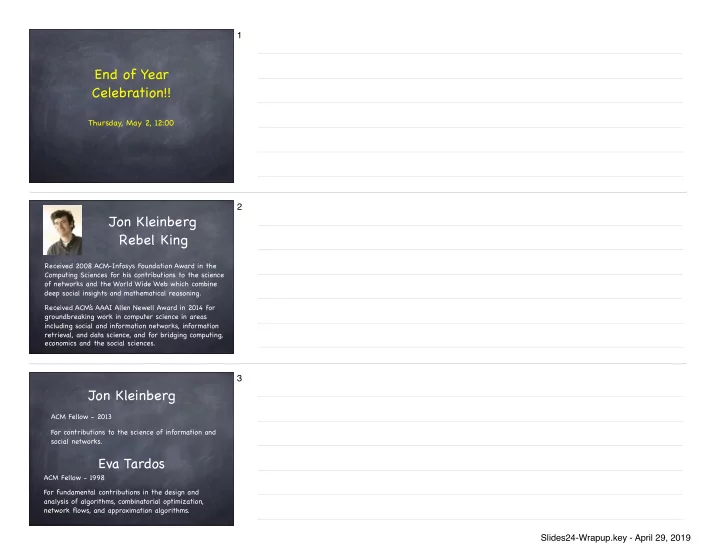

1 End of Year Celebration!! Thursday, May 2, 12:00 2 Jon Kleinberg Rebel King Received 2008 ACM-Infosys Foundation Award in the Computing Sciences for his contributions to the science of networks and the World Wide Web which combine deep social insights and mathematical reasoning. Received ACM’ s AAAI Allen Newell Award in 2014 for groundbreaking work in computer science in areas including social and information networks, information retrieval, and data science, and for bridging computing, economics and the social sciences. 3 Jon Kleinberg ACM Fellow - 2013 For contributions to the science of information and social networks. Eva Tardos ACM Fellow - 1998 For fundamental contributions in the design and analysis of algorithms, combinatorial optimization, network flows, and approximation algorithms. Slides24-Wrapup.key - April 29, 2019
Applications of what we have learned 4 Graph theory: Used to study large networks found in physical, biological and social sciences O() Do you suppose Google cares? Greedy algorithms: Approximation for problems with no known efficient solutions Divide and conquer: Computational geometry Fast Fourier Transform - used to convert analog information to digital Dynamic programming: Computational biology Internet routing Algorithms Timeline 5 1736 - Euler develops graph theory 1945 - mergesort 1956 - Kruskal’ s algorithm 1957 - Prim’ s algorithm 1957 - beginning of dynamic programming 1959 - Dijkstra shortest path 1961 - Segmented least squares 1962 - Ford-Fulkerson algorithm 1962 - Stable Matching Problem defined 1964 - Priority queues invented early 1970s - O() concept formalized early 1970s - NP-completeness defined early 1970s - closest pair of points early 1970s - string comparison 6 Algorithms Researchers who have won Turing Award 1972 - Edsger Dijkstra 1974 - Donald Knuth - analysis of algorithms 1976 - Michael Rabin - helped define P and NP 1978 - Robert Floyd - priority queues 1982 - Stephen Cook - NP-completeness 1985 - Richard Karp - network flow, NP-completeness 1986 - John Hopcroft, Robert Tarjan - analysis of algorithms 1993 - Richard Stearns, Juris Hartmanis - foundations of computational complexity theory 1995 - Manuel Blum - computational complexity theory 2000 - Andrew Yao - complexity theory 2012 - Silvio Micali and Shafi Goldwasser - cryptography, complexity theory Slides24-Wrapup.key - April 29, 2019
7 Algorithms Research Computational Computational Machine learning geometry biology Approximation algorithms Cryptography Scientific computing Complexity theory Parallel Networks computation 8 Topics we have not explored Problems not in NP: planning, games like chess Approximation algorithms Parallel algorithms 9 What is the point of taking this course? Slides24-Wrapup.key - April 29, 2019
Topics Covered 10 O(), Ω (), Θ () Graph algorithms: BFS, DFS, Bipartite graphs, Topological sort Greedy algorithms: Key is finding an order to sort by Proof techniques: staying ahead, exchange Classic algorithms: MST, Dijkstra’ s Divide and conquer: Key is recursion Using recurrence relations to do O() analysis Dynamic programming: Key is memoization Network flow: Ford-Fulkerson algorithm Key is reducing a problem to be a network flow problem P ?=? NP: limits of what is practically computable 11-1 11-2 Please do course evaluations online! Slides24-Wrapup.key - April 29, 2019
Recommend
More recommend